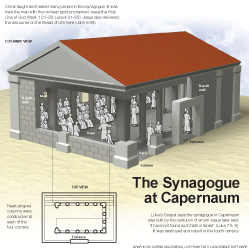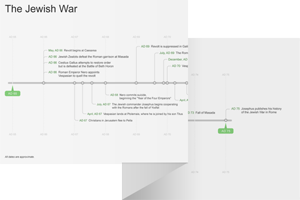12:1–8 Jesus asserts His authority over the Sabbath in an encounter with the Pharisees. He cites two examples to demonstrate that people’s needs outweigh the observance of Sabbath law. |
12:1 the Sabbath The traditional day of rest for the Jewish people as prescribed by the law (Exod 20:8–11; 34:21).
for the Jewish people as prescribed by the law (Exod 20:8–11; 34:21).
pluck off heads of grain According to the law, the edges of fields were to be left unharvested; this showed compassion for people in need, who were allowed to pick the grain (Lev 19:9; 23:22).
12:2 Pharisees These Jewish teachers consider the plucking of grain to be a violation of the Sabbath prohibition against work. See note on Mark 2:23.
12:3 what David did Refers to 1 Sam 21:1–6. David was on the run from Saul and, with the permission of Ahimelech the priest, he ate the sacred bread—a violation of the law (Lev 24:5–9).
12:4 bread of the presentation Loaves of bread placed in the tabernacle sanctuary (Lev 24:5–9). They were considered holy, and only the priests could eat them. See Exod 25:30.
12:5 violate the sanctity of the Sabbath A reference to the duties of the priests, which technically violated the Sabbath but were permitted by God.
12:6 something greater than the temple is here Likely refers to Jesus and His authority (compare John 2:18–21), or perhaps to the kingdom of heaven itself. Ultimately, people’s needs are given preference over legal observance.
12:7 I want mercy and not sacrifice Jesus quotes Hos 6:6 for a second time (compare Matt 9:13 and note).
12:8 Son of Man See 8:20 and note.
lord of the Sabbath Jesus asserts his authority over the Sabbath.
12:9–14 In a second Sabbath controversy, Jesus heals a man with a withered hand, again demonstrating that people’s needs trump ritual observances. His actions provide an example of Hos 6:6 (quoted in Matt 12:7). |
Jesus Heals a Man’s Hand | ||
12:9 synagogue A house of teaching and instruction for those without access to the temple in Jerusalem. See note on Matt 4:23.
of teaching and instruction for those without access to the temple in Jerusalem. See note on Matt 4:23.
12:10 they could accuse him If Jesus heals the man, the Pharisees can accuse Him of working—thus breaking the Sabbath.
12:11 and lift it out Some rabbis taught that, in life and death circumstances, it was permissible to work on the Sabbath (see the rabbinic work, the Babylonian Talmud, Shabbat 148b).
12:12 do good on the Sabbath Jesus argues on the basis that people’s needs outweigh the needs of animals. If Jews are permitted to care for animals on the Sabbath, they should be allowed to help people on the Sabbath.
12:14 in order that they could destroy him The first mention in Matthew that the Pharisees want to destroy Jesus.
12:15–21 In this brief passage, Matthew identifies Jesus as the Suffering Servant, who was prophesied in the book of Isaiah. |
12:16 they should not reveal his identity Jesus has commanded silence before (8:4; 9:30), and it is especially important now that the Pharisees want to destroy him (v. 14).
12:18 The quotation in vv. 18–21 comes from Isa 42:1–4, which is a prophecy about the Suffering Servant. |
 Jesus’ Fulfillment of Old Testament Prophecy Table
Jesus’ Fulfillment of Old Testament Prophecy Table
in whom my soul is well pleased At Jesus’ baptism and transfiguration, a voice from heaven speaks these words (Matt 3:17; 17:5).
12:21 And in his name the Gentiles will hope Matthew follows the Septuagint form of this verse (Isa 42:4 lxx).
12:22–32 In the following section, the Pharisees hear the crowds speaking of Jesus in messianic terms, so they attempt to discredit His ministry. In return, Jesus accuses them of committing an unpardonable sin. He uses an illustration about a divided house to show the implausibility of their argument. |
12:23 Son of David A messianic title. See note on Matt 1:1.
See note on Matt 1:1.
12:24 Beelzebul the ruler of demons The people have just wondered whether Jesus is the Messiah, and the Pharisees accuse Him of being demonic. See 10:25 and note.
12:26 if Satan expels Satan Jesus argues that, if Satan were facilitating exorcisms, he would be counteracting his own attempts to control the world, because he is the ruler of the demons (compare note on 10:25).
12:27 your sons Refers to Jewish exorcists. Jesus turns the tables on His accusers and asks them about the source of the exorcists’ power.
12:28 the kingdom of God has come upon you This is one of many nt verses that presents the kingdom of God as already present with Jesus’ incarnation, despite the fact that it is also an anticipated hope (see Col 1:13; 1 Cor 15:24–28).
 The Kingdom of God: Already but Not Yet
The Kingdom of God: Already but Not Yet
12:29 enter into the house of a strong man Jesus uses this illustration to assert that He already has defeated Satan (the strong man)—which is why He can expel demons (plunder the house). Jesus’ analogy likely comes from Isa 22:15–25. Compare Mark 3:27 and note.
12:31 the blasphemy against the Spirit Speaking with degradation against God’s truth (compare 1 Tim 1:20). In this case, it refers to the Pharisees’ claim that Jesus’ power comes from Satan, rather than the Spirit of God.
will not be forgiven They cannot receive forgiveness because they refuse to acknowledge that Jesus’ power comes from the Spirit. In doing so, they essentially refuse to believe in Jesus.
12:33–37 The Pharisees’ assessment of Jesus’ power reveals their true nature. As the fruit of a tree indicates the nature of a tree, so their actions indicate their evil intent. |
12:33 for the tree is known by its fruit A person can identify a tree based upon the fruit it produces; so too with the Pharisees (see 3:8, 10). Their remarks about Jesus’ source of power identify them as wicked enemies of God.
12:34 Offspring of vipers See note on 3:7.
12:36 day of judgment See 10:15 and note.
12:37 by your words you will be vindicated Since words express the heart, good words demonstrate a good heart, and bad words a bad heart. On judgment day, words will provide evidence for vindication or condemnation.
12:38–42 Some Pharisees wish to see a sign from Jesus to prove His authority. The only sign they will receive is Jesus’ resurrection, which He refers to metaphorically. Compare 16:1–4. |
12:38 scribes and Pharisees Two groups of Jewish religious leaders. See note on 2:4; note on Jn 1:24.
a sign They request an unambiguous act that will prove Jesus’ identity and message (Matt 16:1). Jesus has already performed many such signs.
12:39 adulterous generation Adultery is widely used in the Bible as a metaphor for sin and unfaithfulness to God (e.g., Isa 57:3; Ezek 16:32; Hos 1–3; Jas 4:4).
the sign of the prophet Jonah Jonah’s rescue from the great fish was a sign that the prophet and his message were from God. Similarly, the ultimate sign validating Jesus would be His triumph over death (Matt 12:40). Although the Pharisees likely did not understand Jesus’ statement, they might have recalled it after His resurrection.
 Jesus’ Fulfillment of Old Testament Prophecy Table
Jesus’ Fulfillment of Old Testament Prophecy Table
12:40 three days and three nights See note on Luke 24:1.
Son of Man See Matt 8:20 and note.
12:41 they repented at the proclamation of Jonah In contrast to many of Jesus’ contemporaries, the recipients of Jonah’s message—who were Assyrians, the enemy of God’s people—repented. See Jonah 3.
12:42 The queen of the south Refers to the Queen of Sheba, who visited Solomon and marveled at his wisdom (1 Kgs 10:1–13; 2 Chr 9:1–12). In contrast, the scribes (teachers of the law) and Pharisees refuse to accept the wisdom of one greater than Solomon.
who visited Solomon and marveled at his wisdom (1 Kgs 10:1–13; 2 Chr 9:1–12). In contrast, the scribes (teachers of the law) and Pharisees refuse to accept the wisdom of one greater than Solomon.
12:43–45 Jesus describes the evil and adulterous generation in terms of a disembodied spirit who returns to its host with greater severity. |
12:45 seven other spirits Seven is often used as a number of completeness or totality in the Bible; here, the possession by demons involves a complete takeover of the person.
this evil generation Despite His many miracles, Jesus’ divine authority is called into question repeatedly. This parable warns against such stubborn disbelief. By rejecting Jesus, the generation will become even more vulnerable to the forces of darkness. This could also refer to the fall of Jerusalem, which occurred 35–40 years after Jesus’ ministry (ad 70).
12:46–50 Jesus’ direct opposition to the religious establishment of His day drew the attention and concern of His family. Here, Jesus defines His extended family as those who do the will of His heavenly Father. |
12:46 mother and brothers Jesus’ earthly father, Joseph, is not mentioned in any of the Gospels after the trip to Jerusalem when Jesus was 12 (Luke 2:41–51). His absence might indicate that he had died.
12:50 my brother and sister and mother Jesus is not negating the importance of the natural family, but He is emphasizing the greater importance of the spiritual family. Commitment to Jesus and His cause is a higher loyalty than familial loyalty.

|
About Faithlife Study BibleFaithlife Study Bible (FSB) is your guide to the ancient world of the Old and New Testaments, with study notes and articles that draw from a wide range of academic research. FSB helps you learn how to think about interpretation methods and issues so that you can gain a deeper understanding of the text. |
| Copyright |
Copyright 2012 Logos Bible Software. |
| Support Info | fsb |
 Loading…
Loading…


